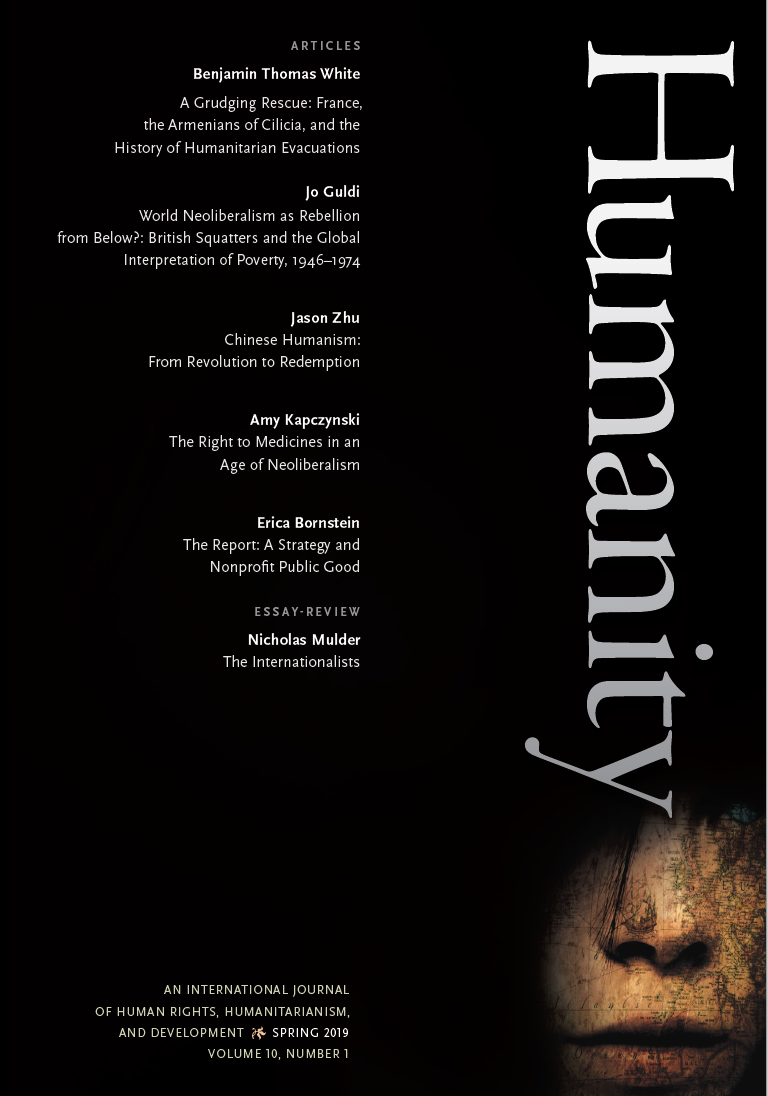HUMANITY, VOLUME 10, ISSUE 1
 In our new issue we feature Amy Kapczynski’s essay on neoliberalism and the right to medicine. Also in this issue are essays on Armenians and the history of humanitarian evacuations, the changing politics of squatting in Britain, Chinese Humanism, and the genre of NGO reports in India. We end with a review essay on the attempt to outlaw war.
In our new issue we feature Amy Kapczynski’s essay on neoliberalism and the right to medicine. Also in this issue are essays on Armenians and the history of humanitarian evacuations, the changing politics of squatting in Britain, Chinese Humanism, and the genre of NGO reports in India. We end with a review essay on the attempt to outlaw war.
TABLE OF CONTENTS
Abstract: Humanitarian evacuation is today a well-known practice, but as an articulated policy it only dates back to the evacuation from Macedonia of Kosovo Albanian refugees in 1999. This article investigates a much earlier example, the evacuation of Armenians from Cilicia (now in southern Turkey) by France in 1921. It shows how the evacuation of entire populations over long distances became thinkable, in an age of mass displacement and emerging humanitarian consciousness, and practicable, as military logistics were applied to humanitarian crises. It analyzes the
Read More »
Abstract: This article considers connections between British anarchist theorists of squatting who emerged from the postwar housing crisis and World Bank experiments with titling squatters in the third world. It demonstrates that theorists of squatting such as Colin Ward and John F. C. Turner advocated for the ingenuity and intention of squatters in ways that resonated later with free-market thinkers, even while London’s squatters pushed an extended right to occupation that required the expansion of the state. By the 1970s, while British students squatted in
Read More »
Abstract: In 1980s, humanism and human rights gained political momentum among reform-minded intellectuals within the Chinese Communist Party, who tried to incorporate the discourse into cultural and political projects they envisioned for the Party, which was operating under a reformist agenda. This project has been largely forgotten today, because it had failed politically. But as a cultural project it survived and changed the Chinese culture of the self. This paper revises the notion that the 80s was a period of cultural enlightenment that failed politically.
Read More »
Abstract: Has the human rights movement helped entrench neoliberalism? Could it help displace it? This article analyzes “right to medicines” cases, arguing that human rights, even in “socioeconomic” form, can intensify inequality and reproduce neoliberal logics, where they are simply overlain upon the existing political economy. But other versions of human rights are possible too. By tracing the efforts of access to medicines groups to link the right to health to reforms of local and global intellectual property laws, I explore a form of human
Read More »
Abstract: In the context of increasingly stringent state regulations governing civil society, some groups in India have turned to report writing as a form of advocacy for civil society itself. Involving collaboration between NGOs and civil servants, reports make demands upon the state and seek to hold the government accountable for promises of welfare entitlements. Once written, reports are mobile technologies used to negotiate with governmental bodies, to galvanize and constitute the nonprofit sector as a coherent entity, to justify the value of NGO work,
Read More »
The Internationalists: How a Radical Plan to Outlaw War Remade the World Oona A. Hathaway and Scott J. Shapiro New York: Simon & Schuster, 2017. xxii + 430 pp. If one asked a group of historians, political scientists, and lawyers what they would consider the single most important treaty or international agreement of the last two centuries, one could expect a familiar set of names to be cited: Vienna, Versailles, the Geneva Conventions, Bretton Woods, Yalta, San Francisco, the GATT, Rome, Helsinki. Few would name
Read More »
 In our new issue we feature Amy Kapczynski’s essay on neoliberalism and the right to medicine. Also in this issue are essays on Armenians and the history of humanitarian evacuations, the changing politics of squatting in Britain, Chinese Humanism, and the genre of NGO reports in India. We end with a review essay on the attempt to outlaw war.
In our new issue we feature Amy Kapczynski’s essay on neoliberalism and the right to medicine. Also in this issue are essays on Armenians and the history of humanitarian evacuations, the changing politics of squatting in Britain, Chinese Humanism, and the genre of NGO reports in India. We end with a review essay on the attempt to outlaw war.